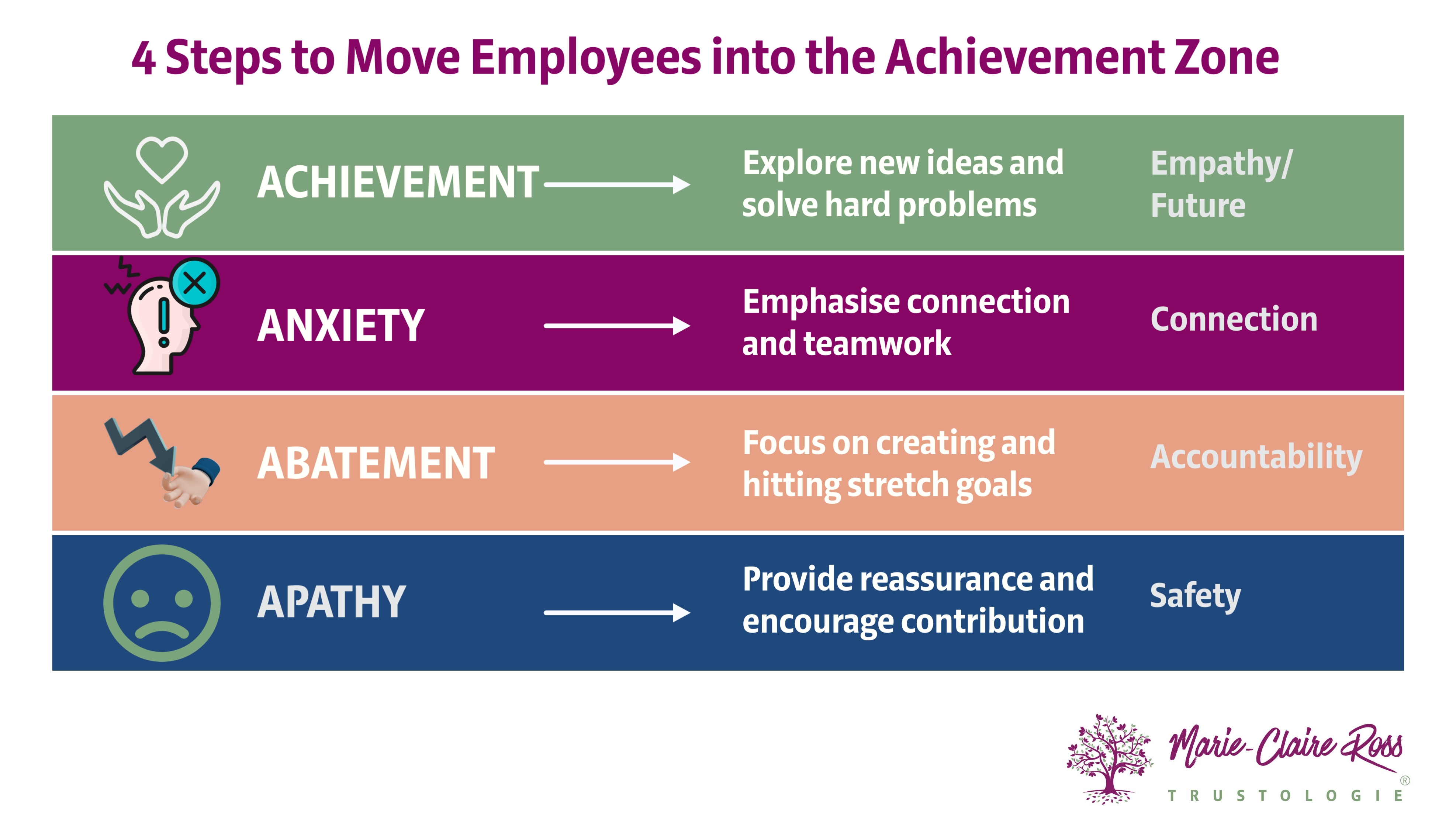11 min read
4 Practical Strategies for Better Emotional Management in the Workplace
I have a friend who often finds herself at the mercy of her emotions. Recently, she called me to rehash a confrontation she’d had with a group of...
Develop leaders, strengthen executive teams and gain deep insights with assessments designed to accelerate trust and performance.

Transform how your leaders think and perform with keynotes that spark connection, trust and high-performance cultures.

Explore practical tools, thought-leadership and resources to help you build trusted, high-performing teams.

Trustologie® is a leadership development consultancy founded by Marie-Claire Ross, specialising in helping executives and managers build high-trust, high-performing teams.

5 min read
Marie-Claire Ross : Updated on December 7, 2023

One of the wonderful things about working in a company with a variety of people is that you get to experience lots of different personality types.
Sometimes we have some colleagues who seem to make lots of complaints about others fooling us into believing that the more kind and empathetic colleague is the actual villain. How do we know the difference? Who do we believe?
Let's take a look at some of the common things toxic people do and contrast it to what kind people do.
Toxic people like to hate others. There is usually someone, something or even some group to loathe and blame. In a workplace, this could be a process, a colleague or a team. Sometimes it can even be customers.
With toxic people their object of scorn is almost an obsession. They love to complain about the enemy to anyone that will listen or make cruel jokes about them. If it is a person or group, it is usually someone who would not hurt them - who has limited power or no colleagues to protect them. They might also be different in some way.
On the other hand, a kind person looks for the good in everyone. They work towards unifying everyone together. They don't take sides and fall into the trap of "us versus them" and creating polarisation. They don't see people as enemies. When they work with toxic people, they speak up about them in a diplomatic way to protect others from getting hurt. They have the courage to take a stand against toxic behaviour.
Toxic people aren't very happy. They tend to only laugh when people hurt themselves. Once we had an employee, who during a training video shoot for a spray tan machine, laughed when the model shivered in her bikini during winter. He gleefully said to me "So good to see a model suffering in the cold in a bikini. She so deserves that."
Conversely, a kind person sees when people are in pain and does something about it. They are the ones that bring two heaters for the model (just in case one stops working).
A toxic person finds it hard to let go of a grievance. Even when it has been rectified, they want to let everyone know how hard done by they were. This could be a bad boss or a company that fired them (years ago). They seem to have endless stories about terrible things that have happened to them. They can't forgive or forget.
Sadly, they have learnt that the squeaky wheel gets the oil. They complain a lot more than others which often gets them privileges and advantages others do not receive.
While a kind person can appreciate the learning they have received from an uncomfortable time. They can look back and reflect on how the situation made them a better person. They have no malice or hatred towards someone that might have "done them wrong." They forgive and move on. They have learnt to tell a positive story from the experience. They carefully choose their words, so they do not blame the other person.
Once I had a colleague who was pulled up by the department head for some pretty terrible behaviour towards a fellow team member. She walked out of the meeting incensed and shouted out to all of us "Can you believe that he's pulled out that ridiculous line that there's two sides to every story! Rubbish, there is only my side. I am the one that's right!"
If there is one thing that signals a toxic person - it's someone who refuses to believe they have done something wrong. They seem to forget any initial act they did to provoke or even hurt another. There is always some justification for what can sometimes be brutal and vindictive retaliation.
True to form they gaslight (yes, just like sociopaths and narcissists) - pretend previous historical events never happened, change the sequence of events, swear something is not true or even amend documents to justify their behaviours. They will even throw in stories of something that didn't happen that confuses everyone around them, so that people start believing them. They create drama and thrive in it.
They also get very upset if you don't uphold the same world view as them. And will often spend a lot of time trying to convince you about their beliefs.
A CEO I know who was often tasked with turning around poor performing companies once told me how he could always tell who was the toxic performer in his leadership team pretty easily. They tended to show their real character by going to him first to complain about other team members. Not just once, or twice, but relentlessly.
Interestingly, the qualities that they complained about in others were always the ones that they needed to improve!
A kind person understands that there are two sides to a story. They will often say things like "This is my memory of events. Feel free to verify that with others." They don't force people to believe them or make a big song and dance about their perspective. They encourage you to check the facts and make the decision on your own accord. They will also try to be as correct as possible and be careful to not blame others unkindly.
You will hear words like "They probably didn't realise how much they hurt me" or "they might not be educated about what it's like to be _______ [Insert community/gender/sexuality]." They also admit at some level that they might have done things that have contributed to the issue and own it.
This is a tough one and where I find most leaders have trouble distinguishing between the real perpetrator and the actual victim. But the good news is the fake victim always leaves a trail of lies and deceit. They is always some history of their misbehaviours. Those that abuse women's rights or have a hatred towards the LGBTQI+ community never do so once. And social media can be a wonderful way to uncover their real viewpoints.
They also blame the victim quite cruelly. They show no mercy. Even if they are clever enough to not do this, there are always some who make flippant comments that reveal the real truth. And of course, they won't (can't) say sorry.
A kind person tells their story and you can feel the real pain. The tears are real. The self-doubt and fear of not being believed is raw. They will apologise for what they might have done wrong.
There is one thing that helps you know if someone is truly kind.
It's love.
I'm not talking about romantic love. I'm talking about love of life and people. Love of our beautiful planet. Love of animals. Kind people sing, they dance, they laugh and they love people. They celebrate. They believe in the good of people. All people. Not just their own. They believe in humanity.
Toxic people. They hate. They look miserable. They don't appreciate the beauty of nature. They scowl. They judge. Their world view is that people are bad and not to be trusted. They like people like them - equally miserable, full of hatred towards others and keen to talk about all of their ailments.
And when you look at it that way, it makes it pretty easy to distinguish a toxic person from a kind person. We can then take the right steps to protect ourselves, and our team, from a place of compassion and a strong belief in not tolerating toxic behaviours.

11 min read
I have a friend who often finds herself at the mercy of her emotions. Recently, she called me to rehash a confrontation she’d had with a group of...

9 min read
True leadership presence isn’t a performance or a set of charisma hacks; it is the felt experience of who you are being in the room. By cultivating...

13 min read
As teams return from their summer (or winter) break, you may notice subtle shifts in your team’s energy. Even if the end of year was positive, a new...

Excited to announce my book launch party. It's going to be a fun event with networking, learning, story-telling and prizes.

If you are like a lot of people around the world, life might seem pretty hard right now.

Transitioning to managing a remote team when your team is normally co-located requires a steep learning curve for both team leaders and team members....